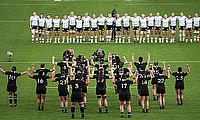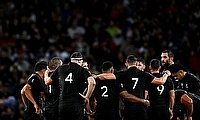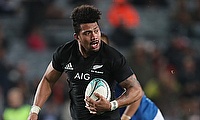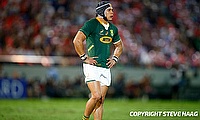A Tribute to Jonah Lomu
TalkingRugbyUnion pays tribute to the 'rugby legend', former New Zealand winger Jonah Lomu, who has died at the age of 40.
The Rugby World Cup Fanzone at Richmond on October 25th was the last time TalkingRugbyUnion witnessed the sheer presence of Jonah Lomu. His contribution to our RWC coverage was continuous throughout, with superb video content.
Hearing of the passing of this great man at 12.35am this morning saddened the rugby world. At TalkingRugbyUnion, we do features, we do analysis and we do reports. We are sometimes sentimental and we have clubs that have influenced our individual careers; that sentimentality comes through in some of our work. We aspire to play rugby at the professional level. We understand the emotion of being selected to represent club, county and country. A rugby man like Lomu has left the field to early and we asked our friend and contributor Alex Shaw to tell us what this sad loss means to him:
‘It seems to me that if you or I must choose between two courses of thought or action, we should remember our dying and try so to live that our death brings no pleasure to the world.’
Those are the words of John Steinbeck and seem particularly significant on a day when the entire rugby world is coming to terms with the loss of the sport’s greatest flagbearer, Jonah Tali Lomu.
With our hearts still heavy from the tragedies that occurred in Paris last week, the loss of Lomu has added further sorrow. At the age of 40, the gargantuan winger was taken far too young and though his battles with ill-health were well-documented, it doesn’t make his passing any easier to accept.
As a five-year-old English child, I really had no interest in rugby when the 1995 Rugby World Cup rolled around. With an ex-Chelsea reserve player as a father, I had a football thrown in my cot and I was bred on a heavy diet of Premier League football and trips to Stamford Bridge.
Unsurprisingly, football quickly became my religion, Anfield my holy land and John Barnes and Robbie Fowler my idols. I was just like 99% of kids growing up in the country at that time.
I wasn’t old enough to have any strong feelings against rugby, but it was certainly of no interest to me. When my father would put the RWC on the TV, I would usually go outside to kick a ball up against the wall or perhaps slip away into the other room to play on my Sega Mega Drive.
Eventually, he convinced me to try watching a game, even if it was just for the first half. That game was England’s semi-final meeting with New Zealand. Unlike my fleeting glimpses of the sport before that moment, where I found the idea of passing backwards ridiculous and the stop-start nature infuriating, I was instantly captivated.
The way in which Lomu almost singlehandedly destroyed England was beautiful, admittedly savage and almost barbaric, but beautiful all the same. His four tries on that day kindled a love for rugby in me that, to this day, has yet to be extinguished. The left boot of Jonny Wilkinson may have fanned the flames of that blaze eight years later, but it wouldn’t have been there if it were not for Lomu.
I still loved football, but when I went out to the garden or to the park from that moment forward, it was a rugby ball that I took with me, not a football. My friends and I were no longer arguing over who was Eric Cantona or Dennis Bergkamp, we all just wanted to be Lomu.
That kind of superstar allure had been missing in rugby until that point and with the advent of professionalism, Lomu’s role as rugby’s poster boy couldn’t have come at a better time. The gentle giant, for that’s what he was, as generous and caring off the pitch as he was brutal on it, was the driving force behind an influx of new fans to the sport. Even now, after his passing, the legacy of Lomu is continuing to drive the global expansion of rugby.
He sits amid a true pantheon of sporting greats to have changed their respective sports forever. Michael Jordan, Muhammad Ali, Pele, Jonah Lomu. They all redefined the boundaries of their sports and their impact permeates through the way those sports are still played to this very day. I wasn’t fortunate enough to witness Ali or Pele live, but Jordan and Lomu at their primes were the closest thing to poetry I have ever seen in sport.
Without Lomu, I would have undoubtedly not fallen in love with rugby or pursued a career in it, but that really just fades into insignificance when you compare it to the impact he’s had on today’s players. You need look no further than Lomu’s own spot, the left wing, to see that legacy, with Julian Savea and George North, two of the game’s brightest stars, certainly built in his mould.
The reality is that Jonah was 15-20 years ahead of his time and he was able to play with a dominance which has never since been matched in the sport. He inspired the generation that we are watching emerge on the global stage right now and for that, we should be eternally thankful.
It’s not just Auckland and New Zealand that have lost their favourite son, it’s the entire rugby-playing world. No one in this sport was untouched by Jonah’s impact.
I can’t do him justice here. I don’t think anyone can in 800 words. But, I hope I have conveyed just how much a single person can change thousands of people’s lives - all for the better - and there can be no truer epitaph for Jonah than this.
They say you should never meet your heroes because they will only disappoint you. I met Jonah once and I can honestly say disappointed is the last word I would use to describe the experience.
Rest easy, big man.








